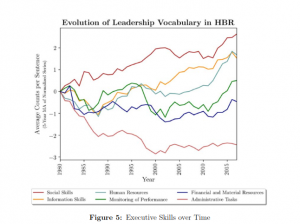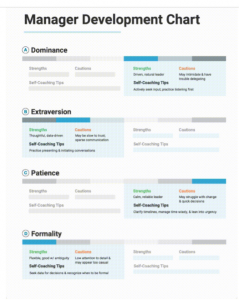The Demand for Social Skills in CEOs
By Alyssa Shaver |
4.1 min read
When looking at the role of high-level executives in shaping the performance of an organization as a whole, we know that there is a standard set of observable characteristics and behaviours that are typically favoured. In recent years, an emerging trend in CEO job descriptions is the clear call for social skills in these executive roles. This trajectory can be seen in the figure below, where the number of times social skills are mentioned trends significantly upwards over a period of 35 years from 1980-2015.

Source: National Bureau of Economic Research, 2021
These are skills that have long been recognized as crucial for brain development by social psychologists. But there has historically been a lack of data on how social cognition is valued in practice for top managerial positions. These skills differ from motivational and soft skills—the demand reflects the very real need to reduce communication friction in an organization in order to keep employees happy and engaged.
Understanding the individual
A 2021 study by the National Bureau of Economic Research found that firms continue to show an increased need for social skills relative to more traditional administrative and operational capabilities. In leaders, social cognition encompasses all the skills required to handle communication and relationships among those they manage. This means understanding the individual and being aware that each person has their own mind with various mental states, including beliefs, intuitions, plans, emotions, information, desires, and intentions and that these may differ from one’s own. With this in mind, CEOs will have a heightened ability to interact, persuade and relate to their employees. This type of emotional intelligence is crucial for developing meaningful relationships with employees at all levels.
Skills to master as a leader
Being a socially aware and engaged leader does not come naturally to all CEOs. It may be helpful to see how social skills in leadership manifest in the workplace to get a better idea of what behaviours and habits to strive for. Here are four that all leaders should develop:
- Interact often: Being aware of how your employees, partners and clients are feeling means you must proactively engage with them, even if through digital means.
- Watch for non-verbal cues: Communication is more than just verbal. Being able to recognize non-verbal and written cues is crucial. This has become more difficult with the rise of virtual and remote work, but there are still plenty of opportunities for leaders to spot and interpret all kinds of communication both in the office and through Zoom, Slack, Email, etc.
- Be clear about your values: While people may join a company for a variety of reasons, they stay because they identify with the values, mission, and vision of an organization. Leaders should regularly reinforce these purposes to ensure consistent alignment.
- Encourage community: Most companies are social in nature. Making a sincere effort as a leader to reinforce positive workplace culture will make employees feel appreciated and part of something larger than themselves.
How to take action
So, can organizations adequately screen potential CEO and other high-level executive candidates for non-verifiable skills such as social cognition? Moreover, is it possible to coach leaders on these skills so they can meet the demand within their organizations? The answer is yes—but only with the right tools.
Luckily, leaders have the ability to leverage data to better understand the behavioural patterns of both themselves and those who work for them. These tools are not new—The Predictive Index has spent the last six decades perfecting the science of talent optimization. In just a few clicks, a CEO can generate reports that demystify their biggest people issues, whether that involves learning how to build emotional intelligence to facilitate more effective conversation, understanding how their own behavioural drives manifest in their management style, or developing their social skills through actionable self-coaching tips.

Source: The Predictive Index
Click here to learn more on how Predictive Index software delivered by Elite Partner Predictive Success can support the development of your organizations management strategy.
About Predictive Success
Predictive Success is an Elite Partner of The Predictive Index® has been consistently ranked in the top 10 of global partners since opening its doors in 2006. Through the Predictive Success team of experienced, professional consulting staff, we give Canadian companies the ‘edge’ to connect people to profit. We work with management teams to bring our knowledge, experience, and over a decade of partnership with The Predictive Index to work. We enable leaders with the power and the knowledge, to better motivate, lead and utilize people to the best of their ability. We have staff and local coverage in all provinces across Canada.
Sources:
Hansen et al. (2021). The demand for executive skills. National Bureau of Economic Research. https://www.nber.org/papers/w28959
Talent Culture. (2013) 5 Social Skills Business Leaders Must Master: https://talentculture.com/5-social-skills-business-leaders-must-master/
Related Blogs
Top 20 Questions to Ask your Boss
Top 20 Questions to Ask Your Boss—Backed by The Predictive Index Whether you're stepping into a new role, joining a fresh team, or just aiming to build a stronger relationship with your current
What Are Leadership Best Practices?
Leadership Best Practices Relating to The Predictive Index: Insights from Predictive Success Effective leadership is the bedrock of any successful organization. Leaders are the visionaries who guide their teams, the decision-makers who drive change, and
What Is The Meaning of Emotional Capacity & How to Best Build It?
What Is the Meaning of Emotional Capacity & How to Best Build It? Emotional capacity is the ability to manage emotions effectively, understand the emotions of others, and remain resilient in the face of stress


